Redirect plugins will ensure that any broken links point to another relevant page on your WordPress website.
That way, if a visitor clicks on a broken link, they’ll simply be redirected to a new location where they can continue browsing. This will help maintain your site’s credibility and prevent your site’s rankings from falling.
Let’s take a look at how to redirect a URL in WordPress, then explore some plugins that can automate the process.
How to Redirect a URL in WordPress
You can use two methods to redirect a URL in WordPress: Either edit your server files or use a redirect plugin. When using a plugin, you’ll need to access the plugin’s settings in your WordPress admin menu, choose the URL you want to redirect, and then specify the new URL.
For most redirects, you’ll want to use a permanent 301 redirect.
What is a 301 redirect?
A 301 redirect is a status code that tells a browser that the page it was trying to access has been permanently moved to another URL. Think of a 301 redirect as a mail forwarder service. If mail ever arrives at your old address, it will automatically be sent to your new home.
How to Manually Redirect a Page in WordPress
1. Find out whether your site is running on Apache.
To manually set up a redirect in WordPress, you’ll need access to your website’s server files. Your site must also be running on Apache software.
To find out whether your site is running on Apache, go to SiteReport, input your URL, and scroll down to the SSL/TLS section. Under “Server,” you’ll find out whether you’re on the Apache infrastructure.
2. Back up your server files.
If you have access to your server files and your server runs on Apache software, you’ll need to add the code to your hypertext access (.htaccess) file to manually set up redirects.
Considering that one mistake in this file can break your whole site, it’s important to make a back-up of this file first.
To do so, go to File Manager and select the .htaccess file. Right-click to rename it .htaccess_old. This is now your backup file.
2. Create a new text file.
Now, go to public_html in File Manager, and create a new text file. Name it .htaccess. This will be your new file.
3. Add the 301 redirect code.
Time to add your code now. Let’s say you want to redirect an outdated post to a more recent one. Then you’d copy and paste the slug of the old or outdated post, then the URL of the new post.
Place the following code at the end of the file, and don’t forget to change the slugs and URL to the correct ones.
RewriteEngine On Redirect 301 /outdated-post/ http://yourwebsite.com/recent-post/
4. Save the file and exit.
You can now save the file and exit File Manager. It’s easy enough, but imagine doing this for every redirect you want to set up. It would take hours of unnecessary and repetitive work.
That’s why WordPress site owners use a plugin.
Why You Need a Redirect Plugin
A redirect plugin will automate the redirecting process and maintain your site’s health in tip-top shape.
Since broken links can hurt your site rankings as well as the visitor experience, it’s critical to avoid them. Clicking on a broken link on a website is like your GPS leading you down a dead-end: frustrating and a waste of time. You don’t want that to happen for your site visitors.
While you should regularly check your website for broken links, it’s particularly important when migrating your site to WordPress. It’s also important if you’re planning to change the URL structures of your pages to remove subfolders.
Manually finding and fixing broken links is tedious and prone to error. Fortunately, redirect plugins can automate and simplify the process for you.
Below, we have listed some of the best redirect plugins that you can use on your WordPress site.
Best Redirect Plugins for WordPress
While WordPress lacks out-of-the-box functionality for checking and replacing broken links, there is a wide selection of WordPress plugins available for that exact purpose.
1. Redirection
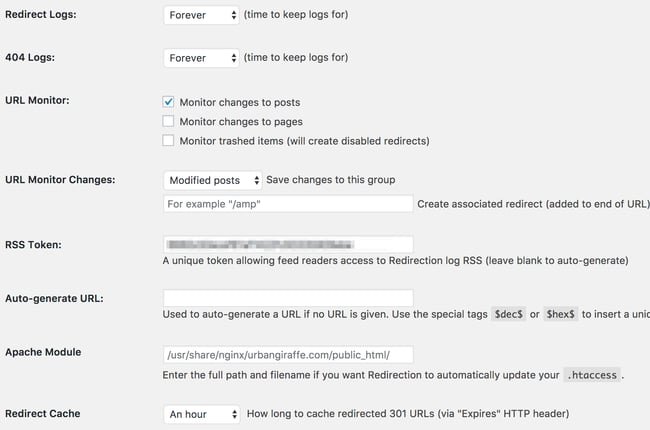
Do you want to keep track of your 404 errors and manage the 301 redirects on your site?
If you answered yes and yes, Redirection is the plugin for you.
With Redirection, you don’t need any knowledge of Apache or Nginx to complete these tasks. You can configure the plugin to automatically create a redirect when the permalink of a post or page is changed or when other conditions are met.
You can also use Redirection’s configurable logging feature to view all redirects occurring on your site and to keep track of information about the visitor, the browser they used, and the referrer.
The best news: this plugin is available in multiple languages and it’s free. For all these reasons, Redirection is ideal if you plan to migrate your content from one site to another, or are changing the directory of your WordPress installation.
What We Like
Redirection is at the top of our list because it offers everything you need to manage and create redirects right within your WordPress dashboard. It automatically detects when you change the permalink of a post or page, then creates a 301 redirect so you don’t have to. You can also set up redirects based on certain conditions, such as the user’s browser and login status.
Recommended For
We recommend Redirection for small business owners, medium-sized businesses, and freelancers who own a small-to-medium website. It’ll cover every single one of your needs in one free, intuitive package. Because it only offers 301 redirects, we wouldn’t recommend it for anyone planning to create temporary redirects.
Pricing: Free
2. 301 Redirects
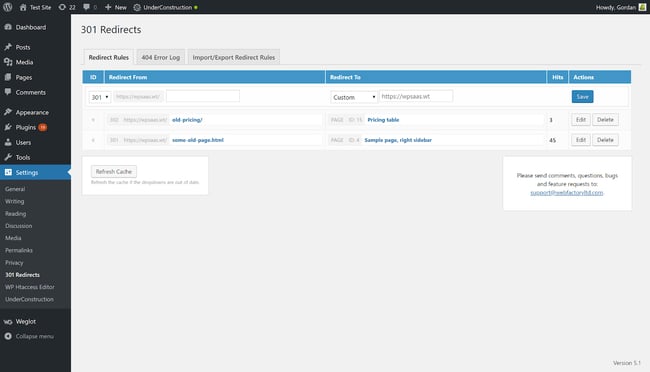
Like Redirection, 301 Redirects is a free and highly-rated plugin. As the name implies, this plugin allows you to create 301 redirects, as well as 302 and 307 redirects. You can redirect old URLs to other similar posts based on title, post types, and categories or tags, or create a new custom URL.
It offers a 404 error log that can help you keep track of error pages. That way, you don’t have to run a manual audit every time, or visit every page to make sure it’s still live. Once the plugin identifies 404 pages, you can then redirect those pages to the appropriate destination. It also offers a bulk redirect tool for you to manage hundreds and thousands of redirects at once. This is specially useful if you want to export all of your site’s URLs and edit them in bulk, then import them once more.
What We Like
301 Redirects makes it into our roundup because of its powerful redirect capabilities. You can create 301, 302, and 307 redirects, making this a great choice if you’re planning to create permanent as well as temporary redirects.
Recommended For
We recommend 301 Redirects for small-to-medium businesses that are planning to set up both permanent and temporary redirects. It’s also a great choice for website owners who are planning to bulk-edit redirects.
Pricing: Free
3. Safe Redirect Manager
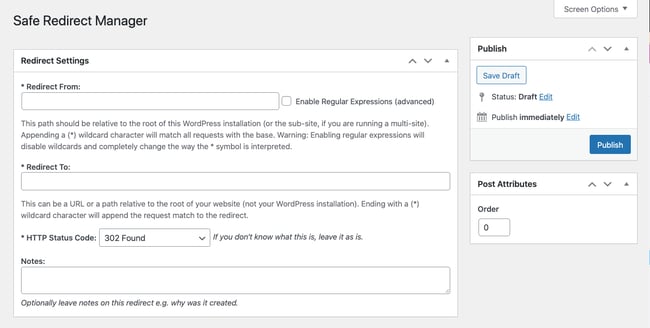
Safe Redirect Manager is another free and top-rated redirect plugin in the WordPress directory. With this plugin, you can easily redirect any pages and posts to new URLs with HTTP status codes like 302 and 301. What makes this plugin different from the others is that it gives you the options for setting up redirects within the post itself. No need to go to the plugin’s settings within your WordPress admin dashboard.
Designed to handle heavy traffic and available in English and other languages, Safe Redirect Manager is a lightweight plugin used on major publishing websites.
What We Like
Safe Redirect Manager is a natural choice for our list because it includes everything you need to create 301 redirects — without any additional frills, such as a 404 error manager. That makes it an attractive plugin to website owners who want to keep their website’s performance high by avoiding heavy plugins.
Recommended For
We recommend Safe Redirect Manager for performance-minded website owners who are worried about installing yet another plugin on their WordPress website. Safe Redirect Manager offers the core essentials — a place to set up 301 redirects for your pages — without any frills. Because it doesn’t offer any bulk editing functionalities, we wouldn’t recommend it for large businesses.
Pricing: Free
4. All in One SEO
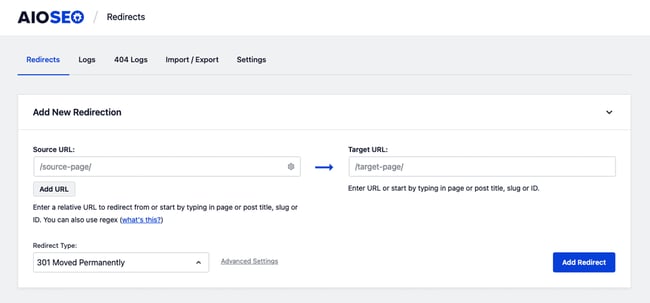
All in One SEO is one of the best SEO WordPress plugins on the market. It offers a free version that comes with everything you need to optimize your website for SEO, and a premium version that offers a powerful redirection manager.
With the redirection manager, you can easily manage 301 redirects, track 404 errors, and fix dead ends. Managing your redirects is as simple as pasting in your old and target URLs into the appropriate fields.
You can even automatically redirect users and search engines to your new content whenever you delete or change a URL. All in One SEO also lets you redirect multiple URLs to the same destination URL, and provides a complete log of all of the redirects and 404s on your site.
What We Like
All In One SEO provides everything you need to create a high-performing website, including a robust 301 redirect manager. You can also create 301, 307, and 410 redirects, so if you’re looking to create a wide variety of redirects while also optimizing your website’s SEO, this is most definitely the plugin for you. It’s one of the most powerful redirection plugins overall.
Recommended For
We recommended All in One SEO for website owners who are in the market for an SEO plugin in addition to a redirection plugin. You’ll get to create any type of redirect you need while also being able to manage other SEO elements such as meta descriptions, sitemaps, and keywords. If you’ve already installed an SEO plugin that works for you, AIOSEO may not be the best choice for you.
Pricing: Free; $49.50/year (Basic); $99.50/year (Plus); $199.50/year (Pro); $299.50/year (Elite)
5. Quick Page/Post Redirect
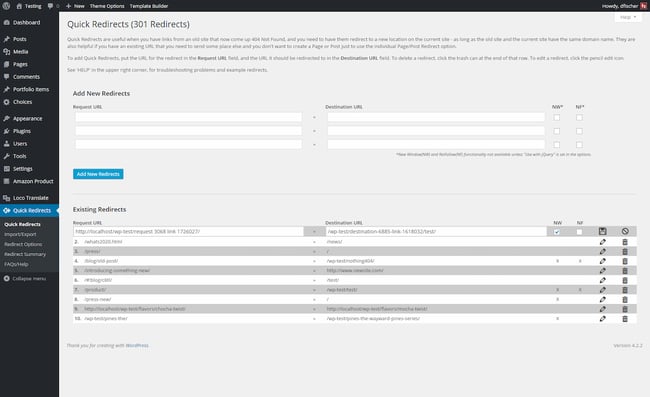
Quick Page / Post Redirect does exactly what it says it does: It helps you quickly redirect old URLs to new URLs using its easy and intuitive interface within the WordPress admin dashboard. You can also add 301 and 302 redirects right within the pages’ and posts’ options, so there’s no need to navigate outside of the post to set up a redirect.
One of the most distinctive features of this plugin is that it allows you to set up redirects for pages that don’t exist yet. If you’re still developing your content strategy and want to set up redirects before the new pages and posts are published, this plugin is most definitely the one for you. You can also bulk import and export redirects for easier redirection in large or enterprise websites.
What We Like
We’ve listed Quick Page / Post Redirect in our list because it’s one of the most powerful options you can choose without spending a dime. It not only includes bulk editing like Safe Redirect Manager, it also allows you to create redirects right within the post’s and page’s meta settings — a feature that other plugins only offer in their paid versions.
Recommended For
We recommend Quick Page / Post Redirect for small-to-enterprise website owners who need a robust yet lightweight redirection plugin — and who are planning specifically to create 301 and 302 redirects. This plugin doesn’t come with a 404 error log, so if you’re hoping to track 404 errors, consider going for 301 Redirects and All in One SEO instead.
Pricing: Free
6. Yoast SEO Premium
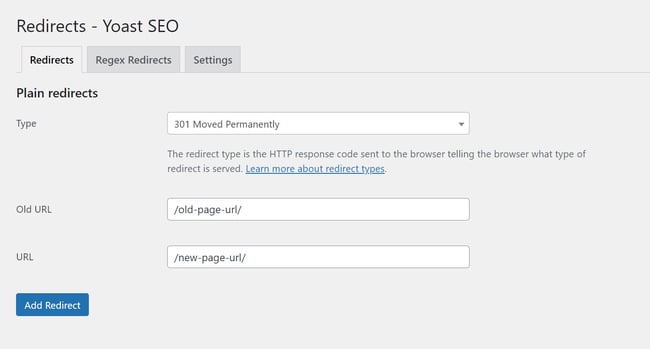
Yoast SEO is one of the most widely used WordPress plugins for SEO. While it offers a free version that comes with lots of excellent features, the premium version comes with a redirect manager.
The redirect manager allows you to easily redirect your pages to another location on your WordPress site. You can use 301 (Permanently Moved), 302 (Found), 307 (Temporary Redirect), 410 (Gone Error), and 451 (Unavailable For Legal Reasons) status codes.
You can even automate this process for existing content on your site. If you change the URL of an existing post or page, Yoast SEO Premium will automatically create a redirect from the old to the new URL. If you delete a post or page, on the other hand, the plugin will immediately notify you to create a redirect.
What We Like
Yoast SEO is one of the few premium options we’ve listed, but it’s worth the $89/year price for a reason — it’s one of the most powerful redirection plugins that automates redirections and offers the widest variety of redirection options. If you’re planning to create 301, 302, 307, 410, and 451 redirects or error codes, this is definitely the plugin for you.
Recommended For
We recommend Yoast SEO for small-to-enterprise website owners who need a powerful SEO plugin in addition to a high-performing redirection plugin. If you foresee that you’ll be restructuring pages or will be deleting old URLs and creating new ones, go for Yoast SEO. It will automatically create a redirect once you change a URL and notify you when you delete a page. However, if you’re a freelancer or blogger, we recommend going for a free tool instead.
Pricing: $89/year
7. SEO Redirection
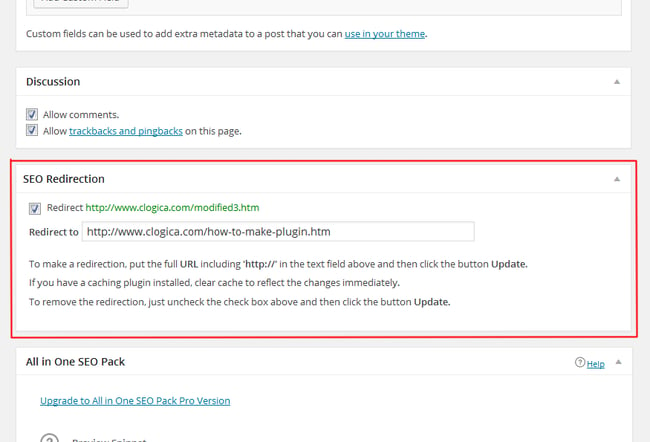
You can set up a variety of redirects for your site using the SEO Redirection plugin. With this free plugin, you can also monitor 404 error pages and redirect them to another location with ease. You can even redirect entire folders and everything they contain, like your index.html file.
Like other plugins mentioned above, SEO Redirection will automatically add a 301 redirect when the URL of a post changes. It will also keep track of all the redirects on your site in one place.
What We Like
SEO Redirection is an easy choice for our round-up due to its powerful features and intuitive interface. You can edit your redirects both in the post’s meta options and within the tool’s settings in the WordPress admin panel. You can also fix crawl errors in Google Search Console and import and export redirections into the tool.
Recommended For
We recommend SEO Redirection for freelancers, bloggers, and small website owners who need extensive features such as 404 error logging, bulk uploading and exporting, and automated redirecting once you change the URL of a page. If you’re looking for a simple tool that offers 301 redirections without frills, go for Safe Redirect Manager instead.
Pricing: Free
8. Simple Website Redirect
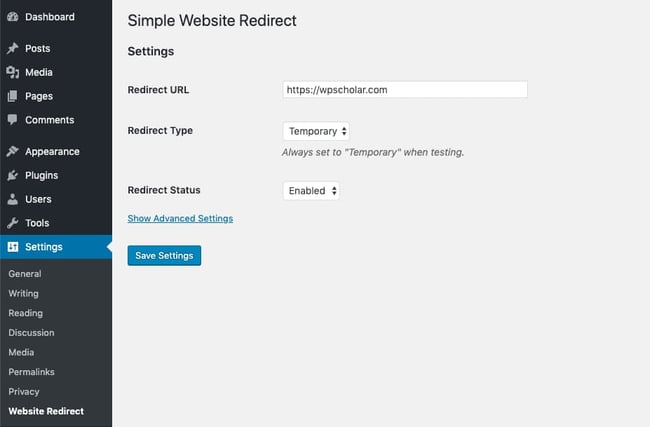
What sets the Simple Website Redirect plugin apart from the others on the list is its scale. While the other plugins allow you to redirect tens to hundreds of URLs on your site, Simple Website Redirect allows you to redirect an entire website to another domain. You can do it both temporarily and permanently.
For one-off redirects where you want to point a URL for an old page to a new page, you can use another plugin mentioned on this list. The plugin author recommends the Redirection plugin, specifically.
What We Like
Simple Website Redirect is an essential plugin for redirecting another website to another website. If you’re wanting to redirect an entire domain, Simple Website Redirect is the plugin for you. It also makes the process of domain redirection easier because you don’t have to log in to your hosting provider’s website to redirect your domain.
Recommended For
We recommend Simple Website Redirect for freelancers, bloggers, and small-to-medium website owners who are looking to redirect an old domain to a new domain. However, if you’re an enterprise customer, consider redirecting your domain using your domain hosting provider’s options.
Pricing: Free
9. Broken Link Checker
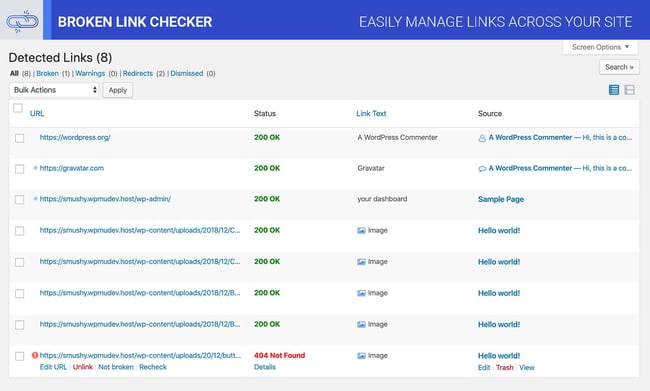
Broken Link Checker was created by WPMU DEV to help site owners monitor not only their posts and pages, but also their comments, custom fields, and blogroll. Once installed, this free plugin will automatically scan your WordPress site for broken links.
It will then notify you either by email or a dashboard notification when it’s done scanning. In a new tab of your dashboard labeled Broken Links, you can edit the links directly without having to manually update each post and page. If you’d rather not add a new URL to redirect the link, you can simply remove it and the text will stay the same.
What We Like
Broken Link Checker not only helps you create 301 redirects, it also helps you detect internal and external broken links. It’s a powerful option for keeping your website posts up-to-date and ensuring you’re delivering high-quality content to your site visitors. It’s a specially powerful plugin when paired with an SEO plugin such as All In One SEO and Yoast SEO.
Recommended For
We recommend Broken Link Checker for small-to-medium business owners who need to consistently monitor the health of their external and internal links. It’s specially useful for directory websites, where users might be linking to old or broken pages. Broken Link Checker gives you the power of removing those broken links so that your site stays broken-link-free.
Pricing: Free
10. 404 Solution
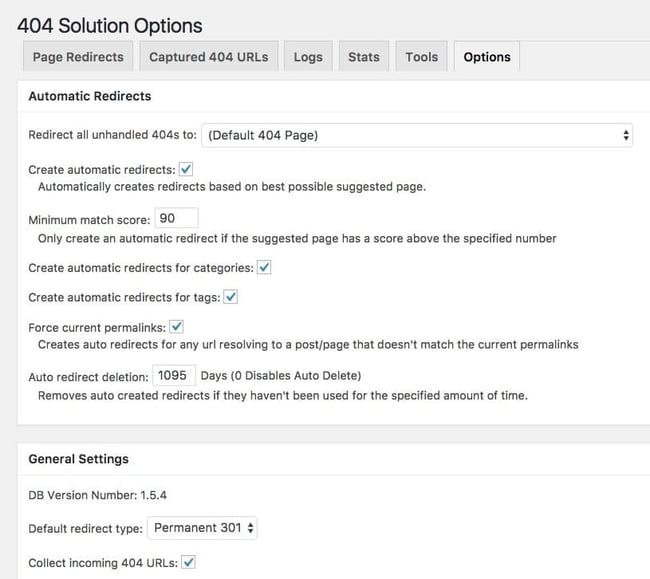
Available for free in WordPress’ official directory, the 404 Solution plugin automatically redirects 404 URLs to existing pages on your site and logs the errors.
If you’d prefer to set up redirects manually or simply review the auto-redirects, then you can view the logged errors in your WordPress dashboard. The 404 Solution plugin will even provide a list of page suggestions to help you find the best possible match for the URL that the visitor was likely trying to reach.
What We Like
If you’ve recently migrated your site and expect visitors to run into 404 errors, then 404 Solution is for you. It’s one of the only tools in this list that’s solely dedicated to detecting 404 errors and redirecting users automatically to the page they were trying to access. It also removes redirects if you ever restore a previously existing page or post.
Recommended For
We recommend 404 Solution for small-to-large business owners who’ve recently migrated their entire website or changed a root folder in their domain. That way, you don’t have to worry if a user accidentally stumbles upon a 404 error page. It will help you keep your website visitors’ experience smooth and error-free.
Pricing: Free
11. 404 to 301
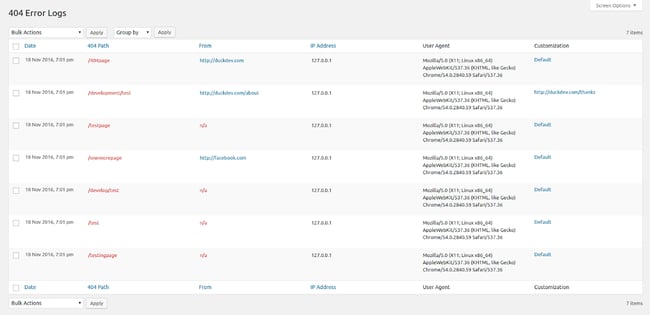
Like the 301 Redirects tool mentioned earlier, 404 to 301 keeps an error log of 404 codes on your website and automatically redirects 404s to an existing page. The moment you delete a post or page, this plugin will pick up on that change and automatically create a 301 redirect to your home page or another page that you’ve chosen.
What We Like
404 to 301 is another robust tool for redirecting 404 error pages to the most appropriate URL match. You can also set custom redirects and monitor all errors, so that you get to pick the best 301 redirect for each error. 404 to 301 also gives you different options for redirection, such 301, 302, and 307 codes.
Recommended For
We recommend 404 to 301 for freelancers and bloggers who’ve changed a root folder on their website or are planning on switching domains. This tool will make it easier than ever to detect 404 errors and automatically redirect users who’ve landed on a non-existing page. It’s also a great fit for website owners who are planning to create temporary redirects.
Pricing: Free
Say goodbye to broken links.
Redirect plugins are an important asset for every website, no matter its age or industry. All of the plugins above can help simplify the process of setting up redirects on your site so you (and your visitors!) don’t have to worry about any dead ends. Many of them are compatible with other plugins, so you can keep extending the functionality of your site with tools like the HubSpot WordPress plugin.
Ref: https://blog.hubspot.com/website/10-best-redirect-wordpress-plugins